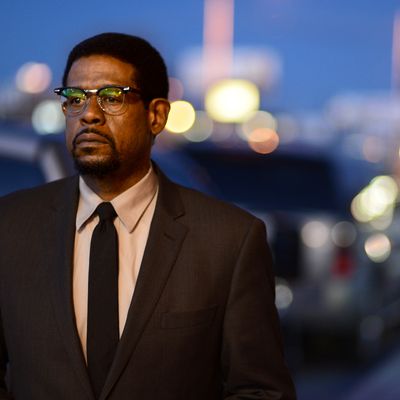
The French-Algerian director Rachid BoucharebÔÇÖs New MexicoÔÇôset crime drama Two Men in Town is playing on one tiny screen in New York and on VOD, neither of which is likely to do justice to its immense visual beauty or the subtlety of its performances. A shame, too, because it absolutely deserves to be seen. ItÔÇÖll be easy for some to dismiss this as a familiar story told all too coolly, but look closer and youÔÇÖll see it has a raging heart.
When we first meet William Garnett (Forest Whitaker), heÔÇÖs preparing to leave prison after 18 years. HeÔÇÖs converted to Islam and become a model prisoner during his time; we see him meet with an aging cleric who gives him a book about religious fortitude and a new suit of clothes in honor of his freedom. ÔÇ£Redemption is always possible for the man who deserves it,ÔÇØ the man tells William. The question is, of course: Does he deserve it, and does he himself think he deserves it?
WilliamÔÇÖs release confines him to a dusty stretch of New Mexico; his parole officer, Emily (Brenda Blethyn), is a fair, but no-nonsense type recently relocated to this corner of the country. The local sheriff, Bill Agati (Harvey Keitel), still harbors a grudge against William for the killing of a deputy, the crime that landed him in prison. WilliamÔÇÖs old friend Terry (Luis Guzman), however, wants to lure him back into a world of crime, and doesnÔÇÖt understand his palÔÇÖs reluctance to get back into the life.
The film is based on a 1973 French crime drama written and directed by the great Jos├® Giovanni, a real-life ex-con who used his time in prison and the underworld to fuel his detailed stories of violent men trying (and often failing) to go straight. GiovanniÔÇÖs work is intense and tersely existential. BoucharebÔÇÖs version is also quiet, but his sensibility is more expansive, less unforgiving. After he is freed, William buys a motorbike and heads out to the desert, just to soak in the openness; to a man whoÔÇÖs been confined for nearly two decades, a blank stretch of sand can mean so much. And Whitaker is such a delicate actor: He can convey worlds of emotion through just a shoulder hunch, or the way he splashes a bit of water on his face. This is a character filled with anger he can barely control, but heÔÇÖs trying. The actor makes WilliamÔÇÖs desire for a clean slate palpable ÔÇö and the slow unraveling of his dreams that much more heartbreaking.
Two Men in Town isnÔÇÖt perfect. The script features some unfortunately on-the-nose dialogue, perhaps the result of the director not being a native English speaker. But mostly, this is a quiet film built out of small gestures and huge spaces, as Bouchareb juxtaposes minute character details with the immense expanse of his setting. That openness, which feels like freedom at first, eventually transforms into its own kind of entrapment. A man on parole lives his life in the open; everything he does is observed, judged. As he finds a job, falls in love, and tries to stay on the straight and narrow, William starts to feel the unremitting glare of the sun, the sand, and the sky.
In previous films like London River and Days of Glory, Bouchareb has made a point of depicting realistic Muslim characters who are a far cry from the terrorists and/or tokens we see in other films. And here, too, thereÔÇÖs a respect for WilliamÔÇÖs religious beliefs thatÔÇÖs rare in this sort of drama; we really do sense that his faith is helping keep his demons at bay. It makes for a beautiful, fascinating contrast. Two Men in Town is a movie about the eternal conflict between the spirit and the world, finely acted and rendered with enormous visual power. ItÔÇÖs very much worth your time.


